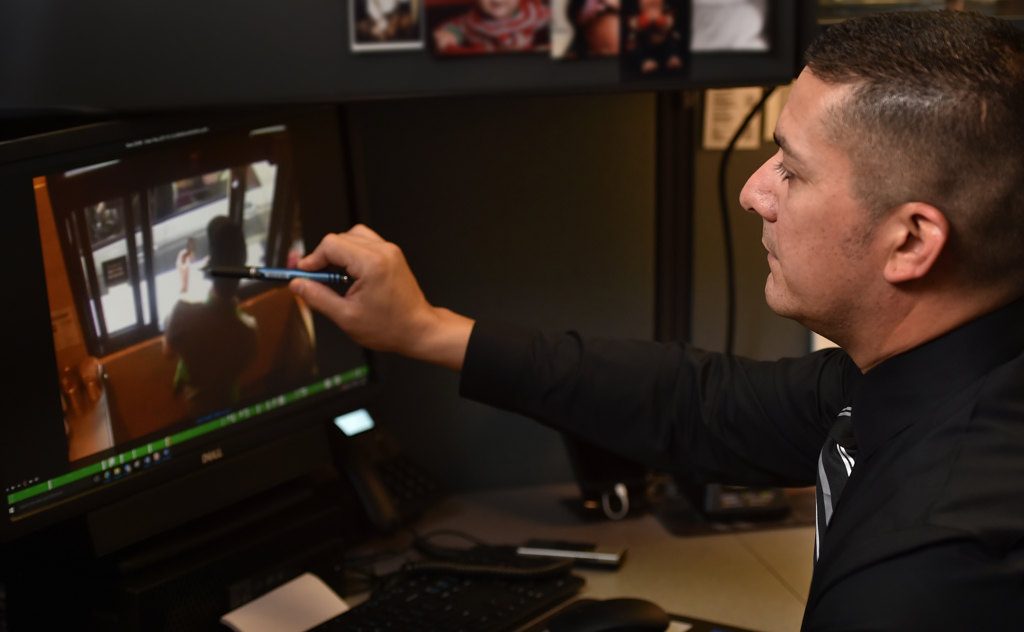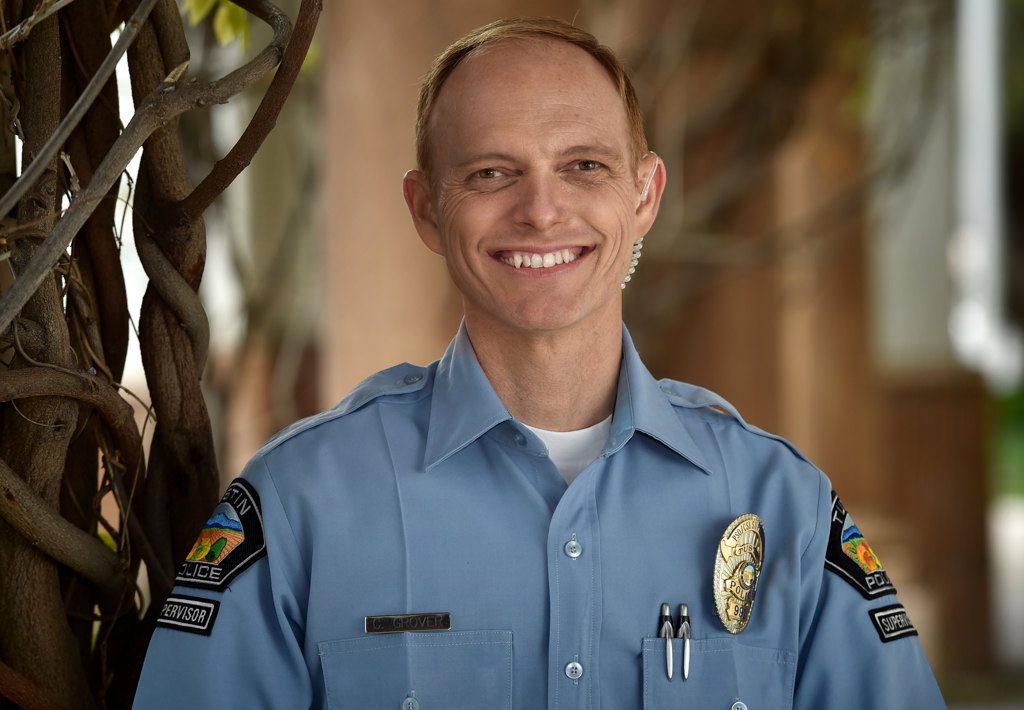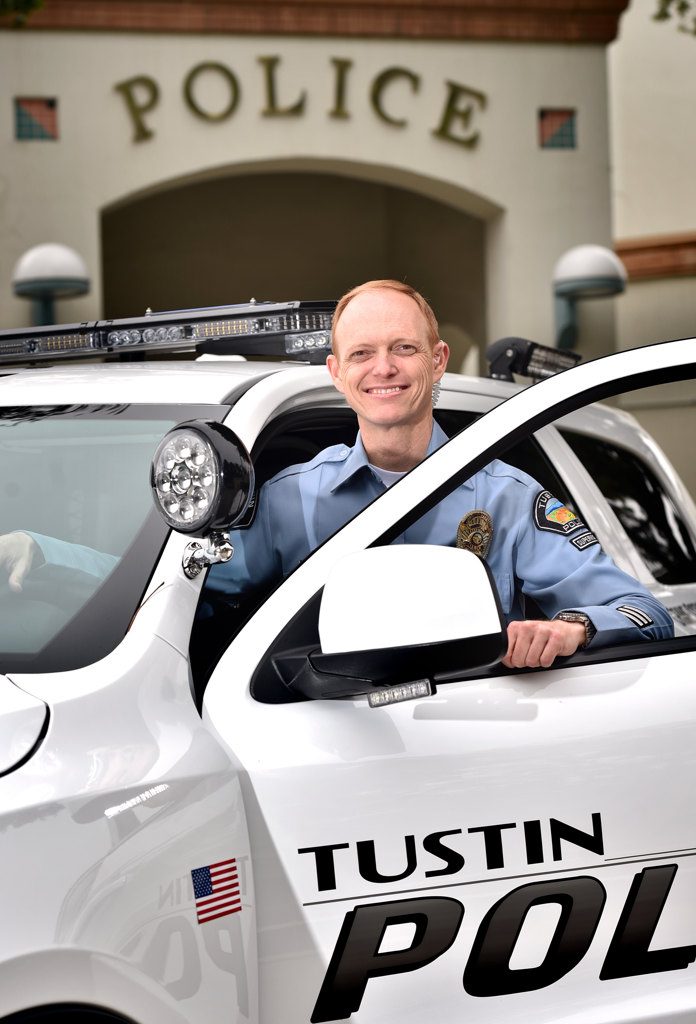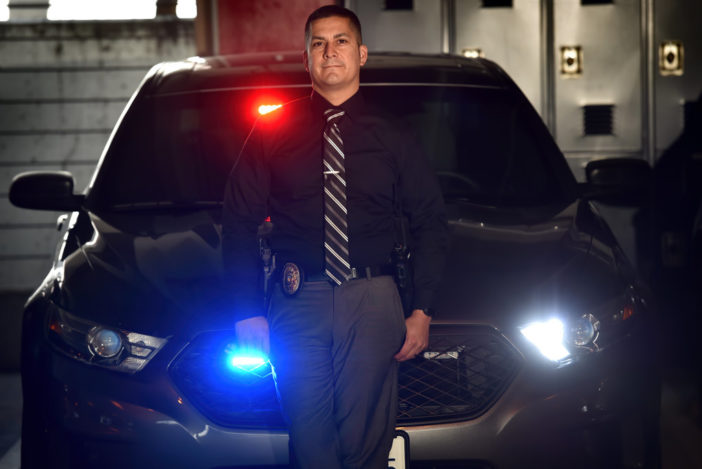In professional baseball, it’s called the farm system — where players in the minor leagues are developed in the hopes of becoming skilled enough to make it to the big leagues.
In law enforcement, the concept’s the same: Identify and recruit youngsters through explorer and cadet programs, and hope the best of them graduate from a police academy and become sworn officers or professional staff members of the agency that groomed them.
The Tustin PD has multiple examples of employees who were groomed from within, beginning in their young teens.
“We like to hire and promote from within our own ranks,” said Lt. Bob Wright, noting that the department has both sworn and civilian employees who have started out their careers as explorers or cadets and are now successful in full-time positions.
“I think it benefits both sides,” Wright added. “We both get to know each other; the employee gains experience and learns about the department, and we get to know about the employee.”
The following are profiles of Det. Shonn Rojas and Police Services Officer Supervisor Chris Grover:
EVENTFUL RIDEALONG
Tustin native Rojas loves graphic design and photography, and thought he would follow the lead of his father, a graphic designer, and go into either profession.
That all changed when Rojas was 15 and a friend, an explorer with the Tustin PD, invited him to a meeting.
“I thought it looked pretty cool,” Rojas said of the experience.
An eventful ridealong that included a K9 pursuit sealed the deal for Rojas, who went to Foothill High School.
“I thought, ‘They get paid to do this?’” Rojas said. “I thought (being a police officer) would be so much fun.”
The night of the ridealong, Rojas told his parents he wanted to become a police officer.
He became an explorer, and never looked back.

Tustin PD Detective Shonn Rojas looks over video surveillance footage of a car burglary suspect.
Photo by Steven Georges/Behind the Badge OC
Rojas, 43, recently secured his dream position of detective in the TPD’s General Investigations Unit. He works property crimes, and in addition to his new position he’s a new father.
“The department has been super-supportive of my goals,” Rojas said.
Rojas worked at a grocery store while serving as a TPD explorer until he was 21. At the time, the agency had no cadet program, and a hiring freeze at the TPD and other O.C. law enforcement agencies forced him to look elsewhere for employment.
So Rojas went through the Los Angeles County Sheriff’s Dept. academy and worked in the jails for 3 ½ years. In June 1998, a position opened up at the TPD and he transferred to his hometown agency.
In reference to his time working in the jails, Rojas said, “It made me grow up really fast and gave me a lot of experience — how to talk to certain people, how not to talk to others — and I used that experience on the streets when I became an officer here.”
Now in his 18th year at the TPD, Rojas started out in patrol but quickly moved to an assignment on the bicycle patrol team. The bikes had sirens and lights, and Rojas and his partners targeted high-crime areas.
“We were very stealthy at night,” he said.
Rojas then worked as a K9 handler — the first of his many career goals. His first dog was Elko, who medically retired, and then Ari, who he worked with for three years.
After six years on the K9 unit, Rojas became a field training officer. He had 10 trainees over five years. Rojas then served as a terrorism liaison officer, working with outside agencies, before promoting to detective seven months ago.
“I’ve liked all my assignments,” Rojas said. “I like challenges. And that’s the key to advancing: You need to have a well-rounded career.”
Rojas said he’s learning a lot working in the General Investigations Unit. He has a caseload of between 30 and 40 crimes and is assigned to any that occur south of the 5 Freeway.
One of the cases he’s currently working involves a suspect who in January broke into a car owned by an elderly couple. The suspect found a wallet in the car and used the couple’s credit cards.
Rojas said he likes the relatively small, family-oriented TPD.
“There’s great camaraderie here,” he said.
Rojas used to be an avid motocross participant, competing in the World Police and Fire Games, until a nasty crash in 2013 on a course in Lake Elsinore sent him to the hospital with a broken sternum, collapsed lung and broken shoulder.
Despite the serious injuries, Rojas came back to work in three months.
And these days, he plays hockey. He competes in a local league..
“I’m not the type of person who likes to sit on the sidelines,” Rojas said.

Chris Grover, Tustin PD PSO/CSI Supervisor.
Photo by Steven Georges/Behind the Badge OC
CROSSING PATHS
Police Services Officer Supervisor Chris Grover, named 2015 Supervisor of the Year by the Tustin Police Support Services Association, crossed paths with Rojas as an explorer.
For a while, both were in the program at the same time.
Like Rojas, an invitation to an explorer meeting when he was a teen got Grover interested in a career in law enforcement.
“I got wildly interested,” said Grover, who grew up in Orange and Tustin and went to Tustin High School. “I’ve always had a respect for emergency responders, and I really started to think, ‘Hey, this could be something I really want to explore more.’”
Grover said the TPD explorer program appealed to him because it’s built on mentoring and discipline, and it reinforces good conduct in school and good grades, and emphasizes being a good citizen.
Grover became captain of the explorer post after Rojas, and served as an explorer until 1995, typically putting in 12 to 15 hours a week.
“I saw this as a career path,” said Grover, who attended Irvine Valley College and studied criminal justice at Cal State Long Beach.
In February 1996, the TPD hired Grover as a full-time dispatcher. He now is in his 21st year at the agency.
“They like to open doors and create opportunities for people,” Grover said of management. “If someone wants to do something else in the agency, they prepare people and they give them opportunities to move up.”

Photo by Steven Georges/Behind the Badge OC
Grover was a full-time dispatcher for four years. Desiring more face-to-face interaction with the public, he applied for Police Services Officer (PSO) and was hired as a PSO in 2000.
At the time, PSOs took police reports and assisted in investigations, but Grover became one of the first to do crime scene investigations. Now, Tustin PSOs routinely engage in CSI duties.
“You need to be willing to go to possibly horrific scenes,” Grover said. “It’s not something you can exactly prepare yourself for.”
Grover served as a PSO specializing in CSI for eight years before he was assigned to the General Investigations Unit in 2008.
“We basically fill the role of civilian investigator and work alongside detectives,” said Grover, who while in the detective bureau handled a lot of cases involving domestic violence, child abuse, elder abuse and identify theft, in addition to assisting detectives on robbery cases.
PSOs can’t make arrests, but they pretty much do everything else, including writing search warrants as well as interviewing suspects, victims and witnesses.
“I loved getting to know people involved in the cases, and being part of bringing around some resolution for the victims, especially children and the elderly and those with diminished capacity,” said Grover.
In 2013, Grover became a supervisor of PSOs. He now oversees six PSOs in various assignments throughout the department. PSO assignments include manning the front counter at the Police Department, working in the field taking reports, conducting CSI, conducting investigations in the investigations unit, and in the community resource unit where they organize the majority of the department’s community events.
Grover said the TPD’s PSO program is “terrific” because employees can move around to different specialties, from CSI to traffic to working with schools, in investigations and with officers who help with recruitment and training.
“It’s a real solid program,” Grover said.
Both Rojas and Grover agree the time they spent starting out in the “farm system” has certainly benefited them in their major league careers at the TPD.
 Behind the Badge
Behind the Badge



